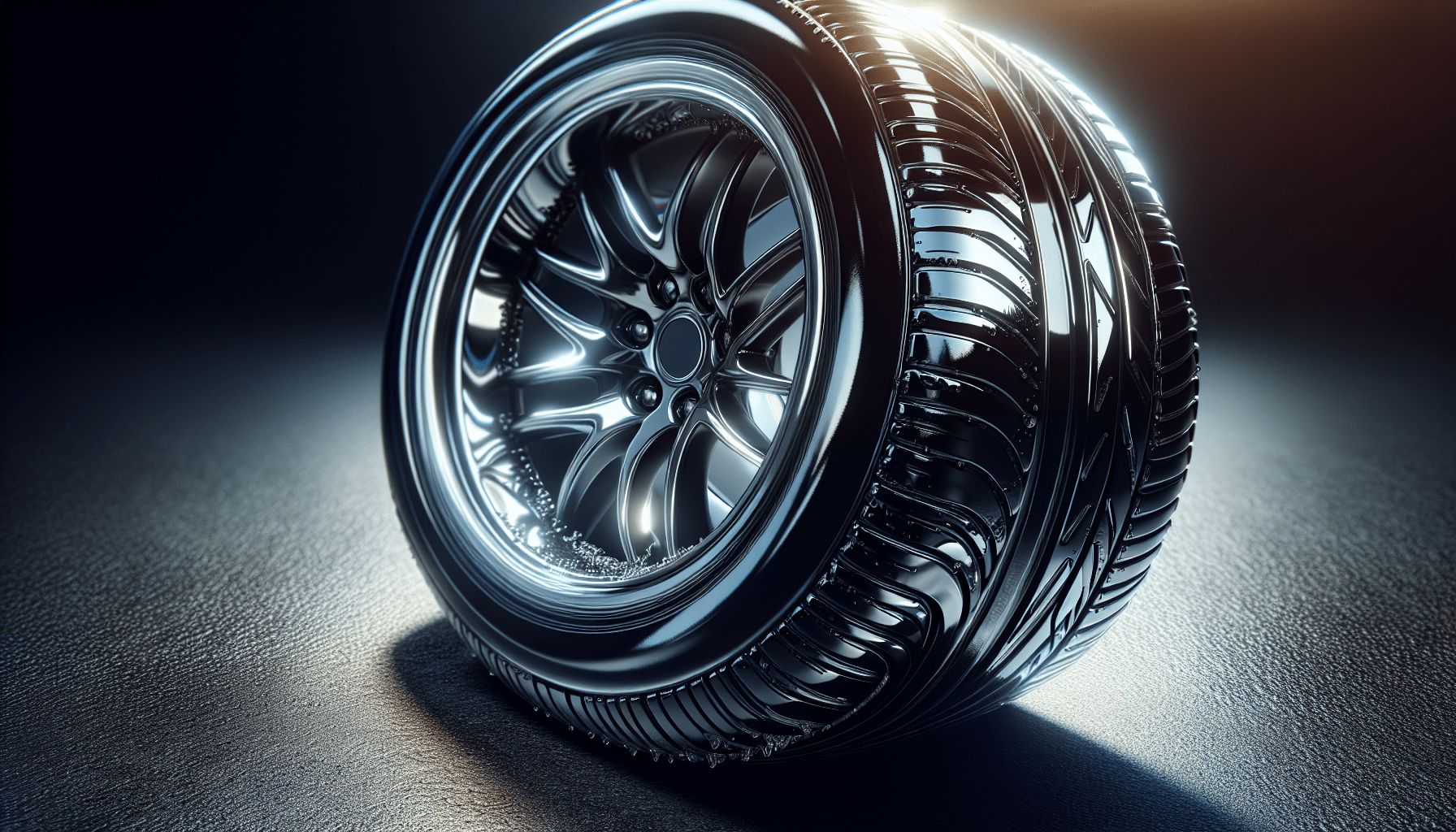Have you ever wondered about the various ways you can protect your vehicle’s tyres from the ravages of time and exposure to the elements? When you think about preserving the sleek look and integrity of your car, tyres might not be the first thing that comes to mind. However, they are essential to maintaining the overall performance and aesthetics of your vehicle. One product that often comes into the discussion is tyre gel. But how effective is it, especially in offering UV protection? Let’s explore this topic in depth.
Understanding Tyre Gel
Tyre gel is a product specifically designed to enhance the appearance of your tyres, giving them that shiny, brand-new look. But, does it do more than just beautify your tyres? The primary purpose of tyre gel is to provide a glossy finish and to condition the rubber of your tyres, preventing them from drying out, cracking, or fading over time. Most tyre gels contain a blend of silicone-based or water-based compounds that give tyres their lustrous appeal.
Types of Tyre Gels
Before we jump into the specifics of UV protection, it’s important to understand the different formulations of tyre gels available in the market:
-
Silicone-Based Gels: Known for their high-gloss finish, silicone-based gels are common due to their long-lasting shine. However, they might attract more dust and dirt due to their sticky nature.
-
Water-Based Gels: Offering a more natural finish, water-based gels are often preferred if you are looking for an eco-friendlier option. They tend to be less sticky but might require more frequent application.
Choosing between these depends on how you prefer your tyres to look and how often you are willing to reapply the product.
The Role of UV Protection in Tyre Maintenance
The sun emits ultraviolet (UV) rays that can have a harmful impact on various surfaces, including tyres. Over time, exposure to UV radiation can lead to the deterioration of the rubber, causing it to become brittle and susceptible to cracking. This not only affects the appearance but can also compromise the safety and longevity of your tyres.
Why UV Protection is Beneficial
Protecting your tyres from UV rays should be a crucial part of your car care routine. Safeguarding against UV exposure can:
- Prevent Premature Aging: Reduces the chances of your tyres drying out and losing elasticity.
- Maintain Aesthetic Appeal: Keeps your tyres looking newer for longer by preventing fading and discolouration.
- Enhance Safety: Ensures that the structural integrity of the tyre is maintained, preventing unexpected blowouts or failures.

Does Tyre Gel Provide UV Protection?
Herein lies the central question: does tyre gel offer the UV protection your tyres need? The answer largely depends on the specific product you choose. Modern formulations of tyre gel now often include UV inhibitors, which are chemicals designed to absorb or block harmful UV rays, thus offering some degree of protection.
Evaluating Tyre Gel Products for UV Protection
When choosing a tyre gel, it’s essential to check the product label or description for UV protection. Look for phrases like “UV inhibitors” or “UV-resistant” to ensure the product indeed offers protection against the sun’s rays.
Here’s a quick comparison of a few popular brands to give you an idea of how they differ in their offerings:
| Brand | Type | UV Protection Mentioned | Additional Features |
|---|---|---|---|
| Gtechniq | Water-Based | Yes | Resist dirt and grime build-up |
| Chemical Guys | Silicone-Based | Yes | Long-lasting shine, dries to the touch |
| Meguiar’s | Water-Based | Yes | Rich dark gloss, non-greasy finish |
| Autoglym | Silicone-Based | No | High gloss finish, water-repellent |
| CarPro | Water-Based | Yes | Easy application, eco-friendly formula |
| Sonax | Silicone-Based | No | Quick drying, intense shine |
| Turtle Wax | Silicone-Based | Yes | Long-lasting, weather-resistant shine |
While some brands like Gtechniq, Chemical Guys, and Meguiar’s provide clear UV protection, others may not specifically mention UV inhibitors. Therefore, you must scrutinize product labels and descriptions before making a purchase.
Application Tips for Maximum Effectiveness
Applying tyre gel effectively not only reduces the risk of overspray but also ensures that you get the maximum benefits, including any UV protection offered by the product. Follow these steps to apply tyre gel effectively:
-
Clean the Tyres: Dirt and grime can hinder the gel’s effectiveness. Use a suitable tyre cleaner to remove debris and allow your tyres to dry completely.
-
Use an Applicator: To prevent waste and achieve even coverage, apply the gel using a dedicated applicator or sponge. This also avoids contact with your skin.
-
Apply Evenly: Spread the gel in a thin, even layer around the tyre sidewalls. Avoid the tread to prevent slippage.
-
Allow to Dry: Let the gel cure on the tyre to form a protective layer. This may also enhance the product’s UV protection capabilities.
-
Reapply as Needed: Depending on the brand, you might need to reapply every few weeks. Regular application maintains the protective barrier against UV damage and offers a consistent shine.

Pros and Cons of Using Tyre Gel
tyre gel undoubtedly brings a host of benefits, but it also comes with some drawbacks. Understanding these will help you make an informed decision.
Pros
- Enhanced Appearance: Tyre gel gives tyres a sleek, new look that enhances your vehicle’s overall presentation.
- Protection Against Elements: Aside from UV protection, good-quality gels can repel water, dust, and grime, simplifying cleaning.
- Flexibility in Finish: You can choose a high-gloss or more muted finish depending on your style preference.
Cons
- Frequent Reapplication: Depending on environmental conditions and product type, you may need to reapply regularly.
- Sticky Residue: Some silicone-based gels may leave a sticky finish that attracts dust and dirt.
- Initial Cost: High-quality gels with UV protection might be more expensive initially, though they may save costs in the long run by prolonging tyre life.
Alternatives to Tyre Gel for UV Protection
If tyre gels don’t seem like the right choice for your vehicle or if you are looking for supplementary methods of protecting your tyres, several alternatives are available:
Tyre Covers
Tyre covers can offer excellent protection from UV rays, particularly for vehicles that are parked outside regularly. These covers shield the tyres from direct sunlight, thus preventing UV damage.
Ceramic Coatings for Tyres
A more advanced option, ceramic coatings provide a robust protective layer that includes UV protection. While these require a more significant initial investment and professional application, they offer long-lasting shine and protection.
Regular Tyre Care
Simple habits such as parking in shaded areas, regular cleaning, and maintaining proper air pressure can significantly reduce UV damage and prolong tyre life.
Final Thoughts
So, does tyre gel provide UV protection? The answer is yes, to a varying extent, depending on the brand and product you select. Many modern tyre gels are now formulated to include UV inhibitors to provide some degree of protection against the harmful rays of the sun. It’s essential to read the product descriptions carefully and choose one that mentions UV protection.
Maintaining the look and integrity of your tyres goes beyond aesthetics. Ensuring your tyres are well-protected, including from UV rays, can enhance performance, safety, and longevity. By selecting the right tyre gel, applying it correctly, and combining it with other protective measures, you can keep your vehicle looking its best while ensuring it performs reliably.
Remember, like any car care product, consistency is key. Regularly applying and refreshing your tyre gel will safeguard against the elements and keep your tyres in tip-top shape for many drives to come. You can check out specific products on our site in the Reviews section. Look at the links at the top of the page such as Product Reviews, Product Comparisons etc.
